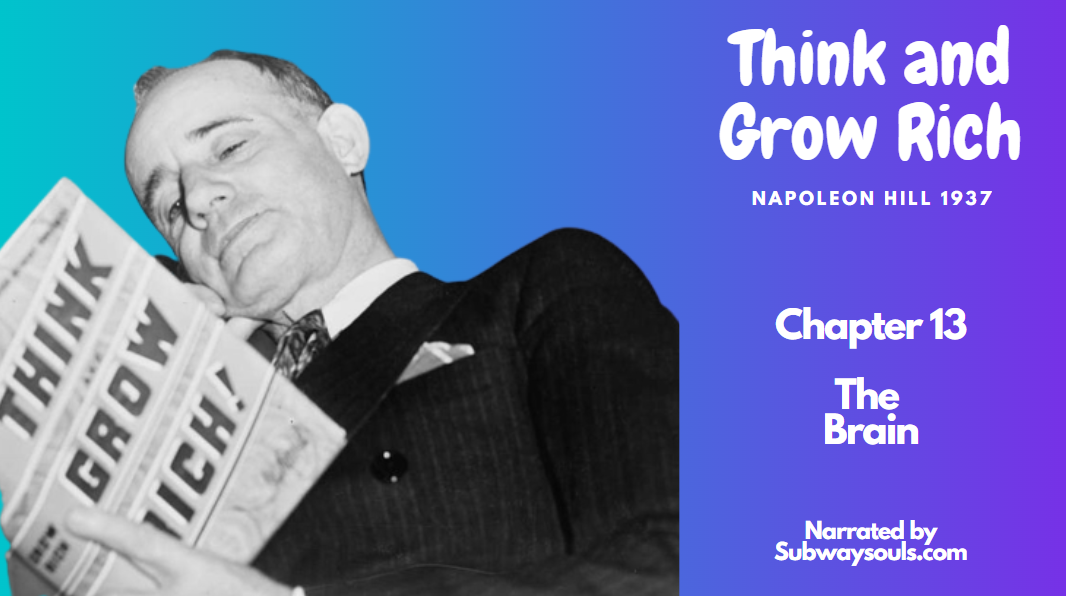Chapter 13 of “Think and Grow Rich” by Napoleon Hill is titled “The Brain: A Broadcasting and Receiving Station for Thought.” This chapter explores the role of the brain in receiving and transmitting thoughts, and how it can be harnessed to achieve success. Here is a summary of the key points covered in this chapter:
1. The brain as a broadcasting and receiving station: Hill compares the brain to a radio station that can both transmit and receive thoughts. He explains that thoughts are the energy waves that are transmitted and received by the brain.
2. The subconscious mind and the brain: Hill emphasizes that the subconscious mind is the connecting link between the brain and the infinite intelligence of the universe. It acts as the receiver and interpreter of thoughts, and the brain is the instrument through which these thoughts are processed.
3. The role of thoughts in shaping reality: Hill highlights that thoughts are the starting point of all achievements. Positive and constructive thoughts can shape one’s reality and lead to success, while negative thoughts can hinder progress.
4. The power of focused attention: Hill emphasizes the importance of focused attention in harnessing the power of the brain. By concentrating and directing thoughts towards specific goals, individuals can activate the creative faculties of the brain and attract the necessary resources and opportunities.
5.The importance of clear and vivid visualization: Hill explains that the brain responds strongly to clear and vivid visualizations. By mentally creating detailed images of desired outcomes, individuals can program their brains to work towards achieving those outcomes.
6. The influence of the dominant thoughts: Hill emphasizes that the dominant thoughts in one’s mind have a significant impact on their reality. By cultivating positive and success-oriented dominant thoughts, individuals can rewire their brains and attract corresponding experiences.
7. Overcoming negative thought patterns: Hill provides strategies for overcoming negative thought patterns and replacing them with positive ones. Affirmations, positive self-talk, and consciously choosing empowering thoughts are suggested as ways to reprogram the brain.
8. The brain and the sixth sense: Hill introduces the concept of the sixth sense, which is the faculty that allows individuals to tap into higher levels of intuition and insight. He suggests that by aligning the conscious and subconscious minds, individuals can activate this powerful sense.
9. The importance of self-discipline: Hill emphasizes that self-discipline is crucial in training the brain and directing its power effectively. By developing habits of positive thinking, focusing on goals, and consistently practising mental exercises, individuals can strengthen their brain’s capacity for success.
In summary, Chapter 13 of “Think and Grow Rich” explores the role of the brain in receiving and transmitting thoughts. It highlights the power of focused attention, clear visualization, and positive dominant thoughts in harnessing the brain’s potential. The chapter emphasizes the importance of self-discipline and cultivating empowering thought patterns to reprogram the brain and achieve success. By understanding and utilizing the capabilities of the brain, individuals can tap into their creative faculties, attract opportunities, and manifest their desired outcomes.
NB: The above is one chapter from the book “Think and Grow Rich” written by Napoleon Hill and first published in 1937.
It is considered one of the most influential self-help books ever written and has sold millions of copies worldwide. The book aims to inspire readers to achieve success in their personal and professional lives by adopting a mindset of wealth and abundance.
The central theme of “Think and Grow Rich” is that success begins with one’s thoughts and beliefs. Napoleon Hill presents a philosophy of success based on the idea that our thoughts can directly influence our actions and ultimately shape our reality. He argues that by developing a burning desire for a specific goal and aligning one’s thoughts, beliefs, and actions with that desire, individuals can overcome challenges and achieve extraordinary success.
Throughout the book, Napoleon Hill shares principles and strategies for achieving success. These include:
1. The power of thought: Hill emphasizes the importance of maintaining a positive mental attitude, visualizing success, and having a clear and definite purpose.
2. Goal setting: He encourages readers to set specific, measurable, achievable, relevant, and time-bound goals (often referred to as SMART goals) and to create a detailed plan for their attainment.
3. Persistence: Hill emphasizes the need for persistence in the face of challenges, setbacks, and failures. He suggests that persistence is a key trait shared by successful individuals.
4. Mastermind groups: Hill emphasizes the importance of surrounding oneself with like-minded individuals who share similar goals and aspirations. He believes that collaborating and exchanging ideas with such a group can lead to greater success.
5. The subconscious mind: Hill explores the power of the subconscious mind and suggests techniques for programming it to support success. He introduces the concept of autosuggestion, which involves repeating positive affirmations and beliefs to reprogram the subconscious mind.
6. The importance of action: Hill emphasizes the need to take consistent and decisive action towards one’s goals. He argues that thoughts alone are not enough; they must be accompanied by action.
“Think and Grow Rich” also features numerous anecdotes and success stories from notable figures such as Thomas Edison, Henry Ford, Andrew Carnegie, and many others. These stories serve to illustrate the principles discussed in the book and provide inspiration and motivation for readers.
Overall, “Think and Grow Rich” presents a philosophy of success that focuses on the power of thoughts, beliefs, and actions. It provides practical strategies and principles that individuals can apply to achieve their goals and attain wealth, not just in terms of money but also in terms of personal fulfilment and happiness.

